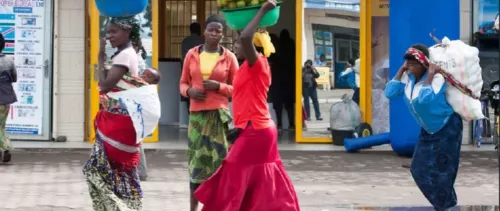
The West African Economic and Monetary Union members flags on gears | © shutterstock.com
West African Economic and Monetary Union (WAEMU) countries have seen increased financial account ownership since 2014, with mobile money accounts driving adoption and usage.
On average, 41% of adults in the WAEMU have an account with a bank or similar institution or with a mobile money service. Senegal has the highest account ownership rate at 56%, but it still falls 15 percentage points below the developing economy average. However, there is room for growth in financial inclusion, and the Global Findex data suggests opportunities to accelerate ownership and usage through digital financial enablement.
Nearly 75% of account owners in WAEMU own a mobile money account.
In 2014, WAEMU countries had low account ownership rates, except for Côte d’Ivoire. Banks and similar institutions held most of these accounts. However, between 2014 and 2021, mobile money accounts boosted account ownership rates across most countries.
41% of adults on average have an account in WAEMU
Adults with an account (%), 2014-22
Source: Global Findex Database 2021.
Some countries saw duplication between brick-and-mortar bank accounts and mobile money, while others like Benin and Togo saw substitution, which might suggest that already-banked adults retired their financial institution accounts in exchange for a mobile money account or that a disproportionally higher share of adults adopted mobile money accounts.
Mobile money is an important enabler of financial inclusion in Sub-Saharan Africa
Adults with a mobile money account (%), 2014-22
Source: Global Findex Database 2021.
But despite overall gains, some countries still have low account ownership rates for poorer adults and women. Account ownership for poor adults in WAEMU increased from 12% in 2014 to 35% in 2021, but the poorest 40% of households have 11 percentage points fewer accounts than the richest 60%. This includes a gap of over 16 percentage points in Burkina Faso and Togo.
Women's account ownership has also increased 20 percentage points over the past decade to 35% in 2021. Mobile money has had a gender-equalizing effect in most countries, except for a 13 percentage point gap in Côte d’Ivoire, where men have adopted phone-based accounts at a higher rate.
Young adults aged 15-35 are less likely to have a bank or similar account, but this age gap is insignificant among mobile money account owners, which is important for younger adults to access digital financial services.
Digital payments are broadly popular in WAEMU
Account usage has increased due to the widespread adoption of digital payments across the WAEMU.
More than half of the adults who receive government payments in the region (except Niger) do so into an account. In addition, over 30% of private sector wage earners receive their wages directly into an account in Benin, Burkina Faso, and Côte d'Ivoire, and over 45% in Mali and Senegal. This has resulted in over 20% of account owners in Burkina Faso and Mali opening their first financial institution account. However, 1.5 million adults continue to receive government wages, transfers, and pensions in cash.
Agriculture payments are still predominantly made in cash, accept in Mali, where almost 40% of farmers receive their payment directly into an account (14% of all adults). However, over 8 million unbanked adults receive agricultural payments in cash across WAEMU, including 4 million women and over 3.5 million poor adults. Yet 5 million unbanked adults receiving these cash payments have a mobile phone. Digitization of these payments into mobile money accounts could help farmers access formal financial services including seed and fertilizer financing and insurance products.
The COVID-19 pandemic has catalyzed digital payment adoption in the region, with over half of the adults who make digital merchant payments across WAEMU countries doing so for the first time during the pandemic. Digital utility payments also saw an adoption boost, although cash remains the dominant method everywhere in the region except Côte d’Ivoire and Mali.
Initiatives to expand financial inclusion should start by enabling digital payments
The expansion of digital financial accounts and payments presents an opportunity to expand financial inclusion, particularly for women and the poor, by leveraging existing momentum for digital solutions.
However, this requires tackling existing barriers to digital access and usage. Across WAEMU, there is a gender gap in mobile phone and government-issued ID ownership. The share of women with a mobile phone or ID is significantly lower than it is for men, which hinders their ability to both purchase a SIM card for their mobile phone or open an account, since ID is a key requirement for both.
In addition, more than half of unbanked adults in the WAEMU express insecurity about using an account independently, while about half of mobile money account owners report needing help using their account. These issues highlight the importance of providing financial education to improve digital and financial literacy skills, along with creation of products that consider customer abilities, and strong protection measures to ensure that customers benefit from financial access.
Taking a holistic approach to closing inclusion gaps for mobile access, documentation, and financial inclusion can have a wide-ranging impact beyond the formal financial sector.


